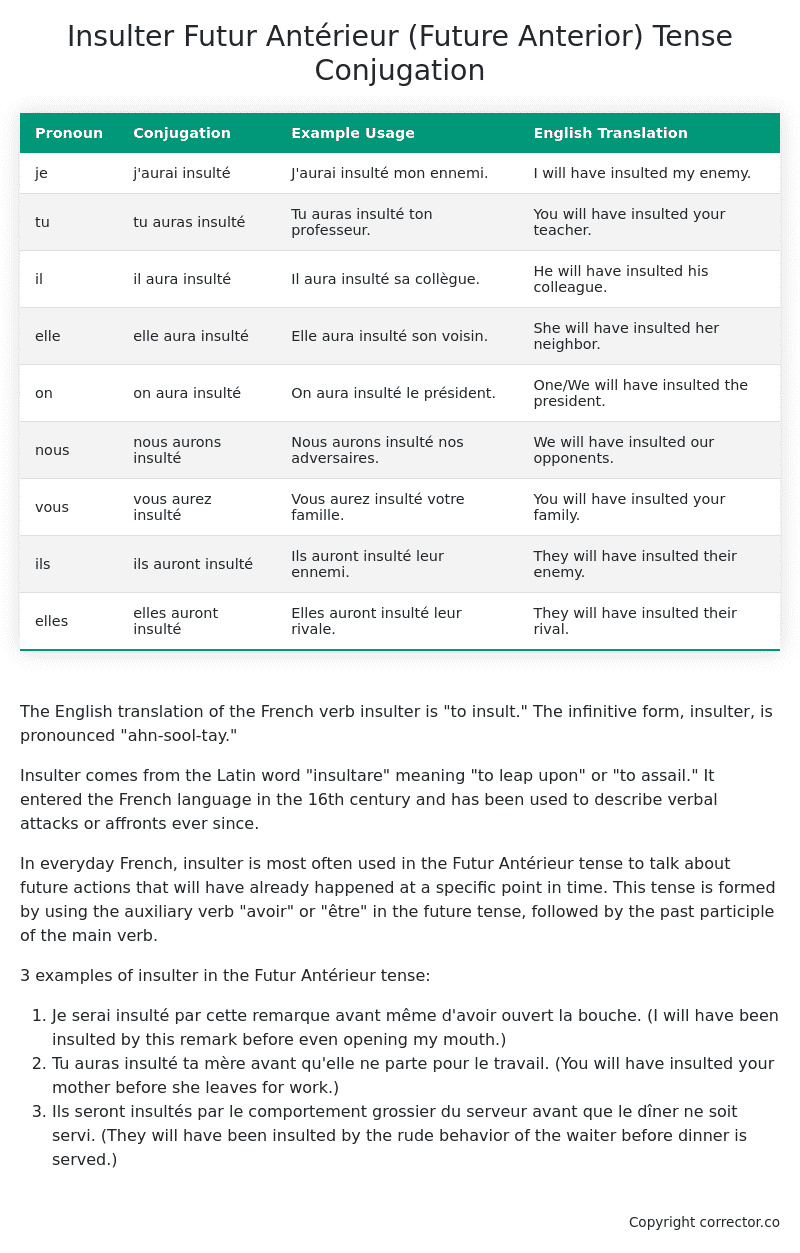Futur Antérieur (Future Anterior) Tense Conjugation of the French Verb insulter
Introduction to the verb insulter
The English translation of the French verb insulter is “to insult.” The infinitive form, insulter, is pronounced “ahn-sool-tay.”
Insulter comes from the Latin word “insultare” meaning “to leap upon” or “to assail.” It entered the French language in the 16th century and has been used to describe verbal attacks or affronts ever since.
In everyday French, insulter is most often used in the Futur Antérieur tense to talk about future actions that will have already happened at a specific point in time. This tense is formed by using the auxiliary verb “avoir” or “être” in the future tense, followed by the past participle of the main verb.
3 examples of insulter in the Futur Antérieur tense:
- Je serai insulté par cette remarque avant même d’avoir ouvert la bouche. (I will have been insulted by this remark before even opening my mouth.)
- Tu auras insulté ta mère avant qu’elle ne parte pour le travail. (You will have insulted your mother before she leaves for work.)
- Ils seront insultés par le comportement grossier du serveur avant que le dîner ne soit servi. (They will have been insulted by the rude behavior of the waiter before dinner is served.)
Table of the Futur Antérieur (Future Anterior) Tense Conjugation of insulter
| Pronoun | Conjugation | Example Usage | English Translation |
|---|---|---|---|
| je | j’aurai insulté | J’aurai insulté mon ennemi. | I will have insulted my enemy. |
| tu | tu auras insulté | Tu auras insulté ton professeur. | You will have insulted your teacher. |
| il | il aura insulté | Il aura insulté sa collègue. | He will have insulted his colleague. |
| elle | elle aura insulté | Elle aura insulté son voisin. | She will have insulted her neighbor. |
| on | on aura insulté | On aura insulté le président. | One/We will have insulted the president. |
| nous | nous aurons insulté | Nous aurons insulté nos adversaires. | We will have insulted our opponents. |
| vous | vous aurez insulté | Vous aurez insulté votre famille. | You will have insulted your family. |
| ils | ils auront insulté | Ils auront insulté leur ennemi. | They will have insulted their enemy. |
| elles | elles auront insulté | Elles auront insulté leur rivale. | They will have insulted their rival. |
Other Conjugations for Insulter.
Le Present (Present Tense) Conjugation of the French Verb insulter
Imparfait (Imperfect) Tense Conjugation of the French Verb insulter
Passé Simple (Simple Past) Tense Conjugation of the French Verb insulter
Passé Composé (Present Perfect) Tense Conjugation of the French Verb insulter
Futur Simple (Simple Future) Tense Conjugation of the French Verb insulter
Futur Proche (Near Future) Tense Conjugation of the French Verb insulter
Plus-que-parfait (Pluperfect) Tense Conjugation of the French Verb insulter
Passé Antérieur (Past Anterior) Tense Conjugation of the French Verb insulter
Futur Antérieur (Future Anterior) Tense Conjugation of the French Verb insulter (this article)
Subjonctif Présent (Subjunctive Present) Tense Conjugation of the French Verb insulter
Subjonctif Passé (Subjunctive Past) Tense Conjugation of the French Verb insulter
Subjonctif Imparfait (Subjunctive Imperfect) Tense Conjugation of the French Verb insulter
Subjonctif Plus-que-parfait (Subjunctive Pluperfect) Tense Conjugation of the French Verb insulter
Conditionnel Présent (Conditional Present) Tense Conjugation of the French Verb insulter
Conditionnel Passé (Conditional Past) Tense Conjugation of the French Verb insulter
L’impératif Présent (Imperative Present) Tense Conjugation of the French Verb insulter
L’infinitif Présent (Infinitive Present) Tense Conjugation of the French Verb insulter
Struggling with French verbs or the language in general? Why not use our free French Grammar Checker – no registration required!
Get a FREE Download Study Sheet of this Conjugation 🔥
Simply right click the image below, click “save image” and get your free reference for the insulter Futur Antérieur tense conjugation!

Insulter – About the French Futur Antérieur (Future Anterior) Tense
Construction
Common Everyday Usage Patterns
Interactions with Other Tenses
For example
Summary
I hope you enjoyed this article on the verb insulter. Still in a learning mood? Check out another TOTALLY random French verb conjugation!


